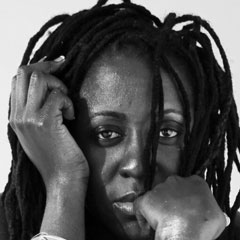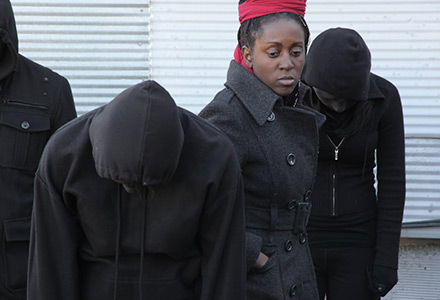Twitter has been abuzz for followers of Peres Owino – Kenyan born actress, dancer, writer and producer – on the heels of vital acclaim at the Pan African Film Festival for “BOUND: Africans Vs African Americans“, same winner of the 2014 Women In Cinema Lena Sharpe Award.
The accolades, including two 2015 nominations for the Black Reel Awards and Image Awards, more than offer a flicker into the vast body of steadfast entertainment by the multitalented graduate of the University of Wisconsin in Green Bay. But “BOUND” is more than entertainment. By all accounts, the voyage is an earnest discourse into the labyrinth of checkered relationships between siblings who are over 400 years old – African Americans and Africans.
DUNIA Magazine’s Editor-in-Chief, Innocent Chia recently caught up with the trailblazing and multifaceted Ms Peres Owino to talk about BOUND (now available on iTunes) and much more.
DUNIA Magazine: At the beginning of every human inquiry is a problem for which answers are sought. What started this journey for you?
 Peres Owino: My journey to BOUND was prompted by a simple question…why was I living in an African American neighborhood but choosing to separate myself from my neighbors?
Peres Owino: My journey to BOUND was prompted by a simple question…why was I living in an African American neighborhood but choosing to separate myself from my neighbors?
Here is what you wrote to me in the run up to this interview. “We will be dealing with this for years to come” – How much do you think this documentary moves the needle in the direction of your intended goal?
Peres Owino: This documentary starts at this present moment and deals with the ills of this present moment. It will influence people in this present moment to change their perceptions thereby moving us to the next present moment. And at that point, another filmmaker, hopefully, will make a docufilm about that present moment thus propelling us into the next…and on and on. Humanity moves from moment to moment, much like we grow from day to day. It is slow and laborious because we are creatures of habit. Habits make us feel safe. Notice I didn’t say they “make us safe” but that they “make us feel safe”. So change is slow.
Something you’ve said somewhere about this journey struck a chord with me: deep friendship between 21/22nd century Africans and African Americans is rare. Beyond why that is so, including fear and choking stereotypes and the fact that true friends are difficult to make when you are a certain age, do you have any remedy from your personal experience?
Peres Owino: First, I highly doubt I said deep friendship is rare because I don’t know every African and African American. But what I can say on the issue is, friends are choices we make. And when we let go of fear, which is mostly fed by stereotypes and hearsay, we are more likely to make the choice to reach across the aisles of ethnicity, “race”, religion, gender and sexual orientation. I make choices everyday of whom to walk with professionally and personally. Those are choices spawned out of letting go of that insidious “us” and “them” mentality. And that letting go can happen at any age. George Wallace, former Governor of Alabama, who famously declared, “Segregation now, segregation tomorrow, segregation forever” recanted as his life drew to a close. Every individual will need to make peace with their negativity towards others by dealing with their negativity towards self because that is where it all begins.
Thank you for making the correction in the first part of this response. I should clarify that I meant to reference what you said earlier about living in an African American neighborhood but separating yourself from your neighbors. I made the same observation in my life that after several years in the US I could count only one true friend who is African American. So, my question is how do we reverse that? Is it important?
Peres Owino: How? By choosing to engage because it is important. Look, the reality of our story is that ours was a violent family disruption and we have to look at that, and all that came with it. There is no precedent for what we need to do here because it is a unique situation. But we have to try, otherwise it will continue linger over us and manifest itself in unhealthy ways, gang violence, civil wars and what have you. Only we can change that.
At the height of police killings of blacks last year, 2014, an African American whose parents are originally from Nigeria blogged some deep feelings. A paraphrase of what she said is that Africans have not and do not show solidarity towards the gross injustices perpetuated on African American lives. She said Africans think they are better behaved and therefore will not encounter such brutality. But she forewarns against such distancing because kids of Africans born in the US are not Africans. The police see them as Black even before they open their mouths. What are your thoughts and should Africans carry separate placards at protests identifying themselves as “Africans united in fighting police brutality and all the isms?
Peres Owino: She makes a valid point. And I have a dear, dear friend from Kenya going through this struggle because she has given birth to a “black” boy in America. Even though his father is Australian, THEIR son is seen as a “black” boy and is now facing the challenges that come with being a “black” boy in a predominantly “white” school. He has already been warned by his teachers against being too “aggressive” and “heading down the road to prison”. Did I mention he was 5 years old?
And their family, and all mixed “race” families experience another layer of insult. Ignoring the “race” of the “non-black” parent, which in this case is European ancestry, is an affront to his father’s influence in his life. It’s like his father and whatever he adds doesn’t matter. We ignore the influence of every other “race” when we segment like this. We should endeavor to get to that place where it is not about Africa or African American placards, but about HUMAN placards. PERIOD. We are on this Earthly ride together. If a solar flare hits the earth, guess what, we all go together. The flares do not respond to a certain level of melanin, we all go together.
And I must say I hate the word “race” because it denotes some sort of competition, which always results in a winner and a loser. And that is exactly what is playing out here…we are racing, socially, racially, economically, you name it.
You are from Kenya, and my culture would consider you in-laws of the United States because President Barack Obama’s father was a Kenyan. Has it been the subject of any conversation throughout this process? If so, how did it come up? If not, are you surprised it did not?
Peres Owino: Actually it has not come up as much mostly because the average American isn’t obsessing about the President’s lineage. People’s minds are on their day-to-day; their children’s education, their mortgage payments, their jobs, their health, their spirituality. Why do you think commercials run so often? Because it takes several tries to get people to turn their attention away from their own lives.
Talk to me about the importance of your collaboration with Isaiah Washington on this initiative? He is one who has been vocal about his DNA roots that trace him back to Sierra Leone among the Mende people.
Peres Owino: It is important in life to know who you are and that begins with knowing where you come from. Isaiah makes an eloquent declaration in the documentary. In Africa people know who you are by who your people are. That identifies your place in the historical narrative of your people, your clan, your district and your country. And that narrative is revealed through lineage imprinted on your DNA.
Does Africa owe African Americans an apology for slavery, or there’s more to the story?
Peres Owino: Each individual African and African American has an individual answer to that question. When you say “Africa” you are also factoring in people who never participated in the trade. When people on opposing sides of history engage in dialogue it is important not to generalize because you end up alienating potential allies. I must add that nations like Benin and Ghana that were deeply affected by the enslavement of Africans have taken responsibility and implemented programs and given land to African Americans whose lineage trace back to those nations. There is definitely more to this story.
I feel like there’s a third party, the colonizer and enslaver, whose voice is as important to this conversation. How much of it is in the documentary?
Peres Owino: Every conversation must begin with a dialogue between two people who set the tone. BOUND is that conversation between two people. So the focus is on the African and African American and how the voices of the colonizers and the enslavers have affected how we see ourselves AND what we, Africans and African Americans, are quietly doing to change that. It is about Africans and African Americans taking care of Africans and African Americans. And the reason that is important is because unless we can engage ourselves, we can’t engage others. The family has to make itself whole.
Oftentimes we hold that if you follow the source of money you can trace who is benefiting from a problem. It is certainly the case with drugs and wars. Does the documentary get into the foray of who might be benefiting from the rift and why?
Peres Owino: No, because that is part of a larger conversation that takes us into the realm of classism. But I am confident that some other passionate filmmaker will be covering it soon enough.
February marks the celebration of Black History month in the United States. How do you think W.E B Dubois, Martin Luther King, Rosa Parks and a myriad other historical Black figures would assess this documentary?
Peres Owino: I hope they would be proud.
What were the most challenges that you found within the respective communities that were the subject of this epic documentary?
Peres Owino: The greatest challenge was finding people bold enough to sit in the room together and be honest about their views…but we did.
What support did you get from the communities and what did you find most unusual and surprising?
Peres Owino: What I found most surprising is how many of us don’t know our own history let alone the history of the other.
Could this lack of knowledge be at the core of the less than desirable relationship?
Peres Owino: It certainly plays a part.
What next for Peres?
Peres Owino: CinemAfrica in Sweden. I have to take it one day at a time.
I always like for my readers to go away with a sense of knowing a little more about our guest than they knew at the onset. What intimate detail would you share about us and how does that affect the passion for what you do and how you do it?
Peres Owino: I love humanity…I genuinely LOVE people and I wish we could give the same unconditional love we give our pets to each other. That we would fight for humanity with the same fervor we fight for whales and white rhinos because we are worth fighting for.
Africans vs African Americans DOCUMENTARY TRAILER
SOCIAL MEDIA CONNECTIONS
Twitter: @BOUND2014
Facebook: www.facebook.com/AVAAtheconversation
Spread the word using #BOUNDAvaa
Peres on Twitter: @peresowino
Innocent Chia is on Twitter: @InnoChia; blog: ChiaReport
—
POLL (vote & see how others are voting)


An interesting interview. Food for thought